Samsung SSD 840 EVO Review: 120GB, 250GB, 500GB, 750GB & 1TB Models Tested
by Anand Lal Shimpi on July 25, 2013 1:53 PM EST- Posted in
- Storage
- SSDs
- Samsung
- TLC
- Samsung SSD 840
Random Read/Write Speed
The four corners of SSD performance are as follows: random read, random write, sequential read and sequential write speed. Random accesses are generally small in size, while sequential accesses tend to be larger and thus we have the four Iometer tests we use in all of our reviews.
Our first test writes 4KB in a completely random pattern over an 8GB space of the drive to simulate the sort of random access that you'd see on an OS drive (even this is more stressful than a normal desktop user would see). I perform three concurrent IOs and run the test for 3 minutes. The results reported are in average MB/s over the entire time. We use both standard pseudo randomly generated data for each write as well as fully random data to show you both the maximum and minimum performance offered by SandForce based drives in these tests. The average performance of SF drives will likely be somewhere in between the two values for each drive you see in the graphs. For an understanding of why this matters, read our original SandForce article.
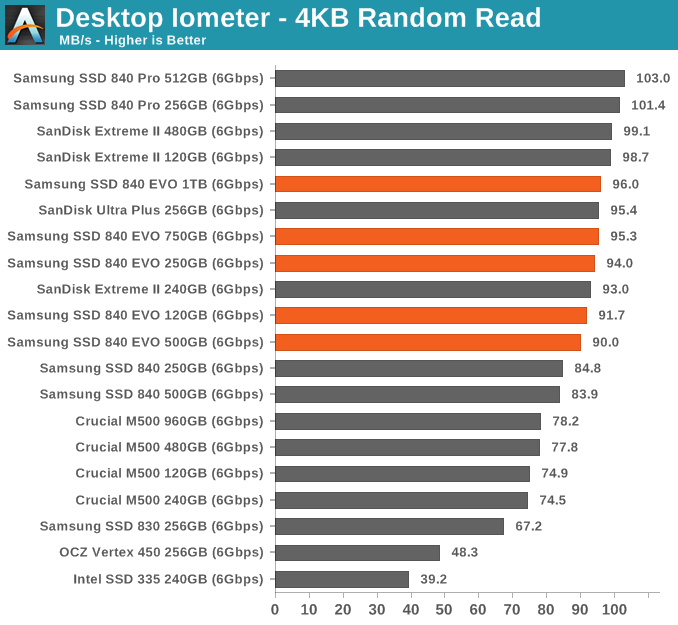
Random read speed is very close to that of the 840 Pro. The EVO doesn't look like a mainstream drive here at all.
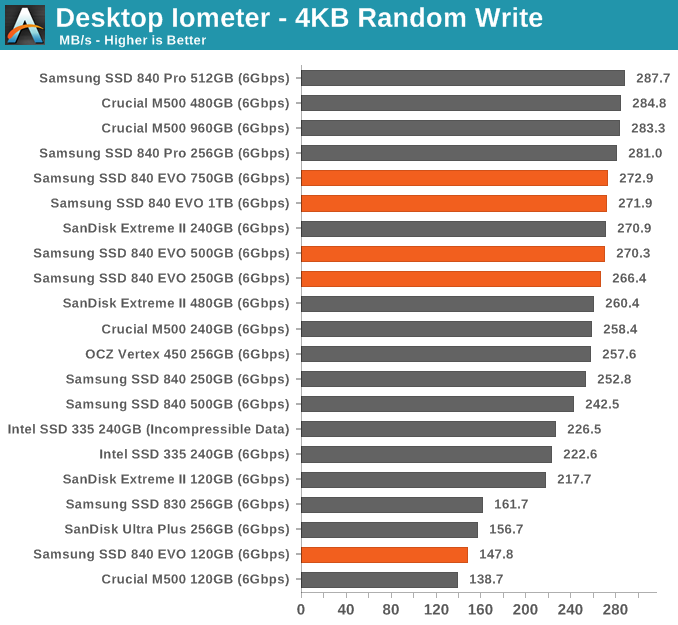
Even peak random write performance is dangerously close to the 840 Pro. Only the 120GB drive shows up behind the pack. I should add that I'll have to redo the way we test 4KB random writes given how optimized current firmwares/architectures have become. The data here is interesting but honestly the performance consistency data from earlier is a better look at what happens to 4KB random write performance over time.
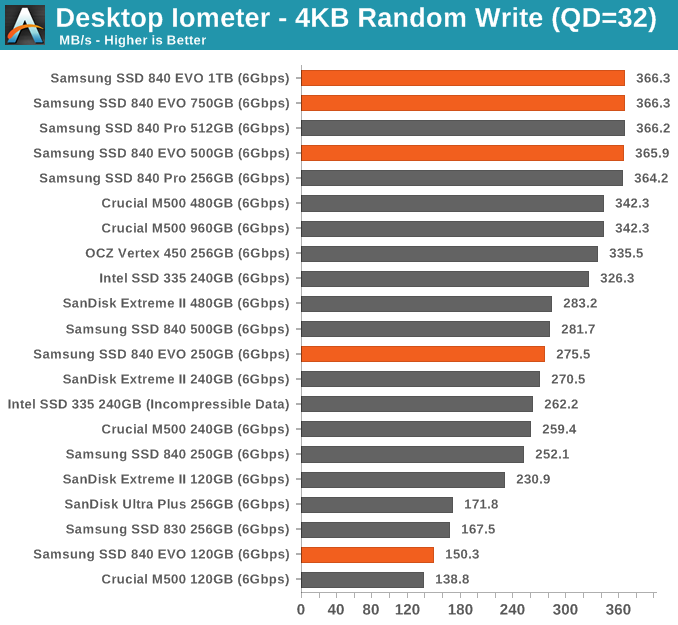
The relatively small difference between QD3 and QD32 random write performance shows you just how good of a job Samsung's controller is doing at write combining. At high queue depths the EVO is just as fast as the 840 Pro here. So much for TLC being slow.
Sequential Read/Write Speed
To measure sequential performance I ran a 1 minute long 128KB sequential test over the entire span of the drive at a queue depth of 1. The results reported are in average MB/s over the entire test length.
Sequential read and write performance, even at low queue depths is very good on the EVO. You may notice lower M500 numbers here than elsewhere, the explanation is pretty simple. We run all of our read tests after valid data has been written to the drive. Unfortunately the M500 attempts to aggressively GC data on the drive, so even though we fill the drive and then immediately start reading back the M500 is already working in the background which reduces overall performance here.
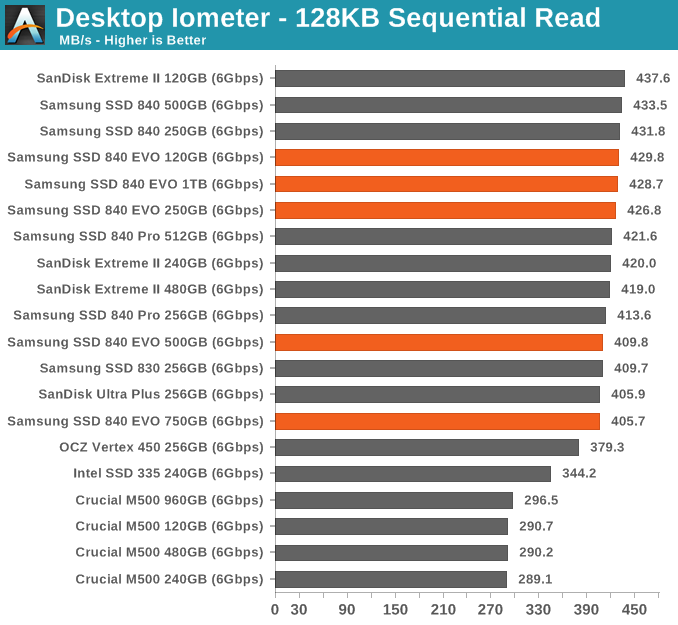
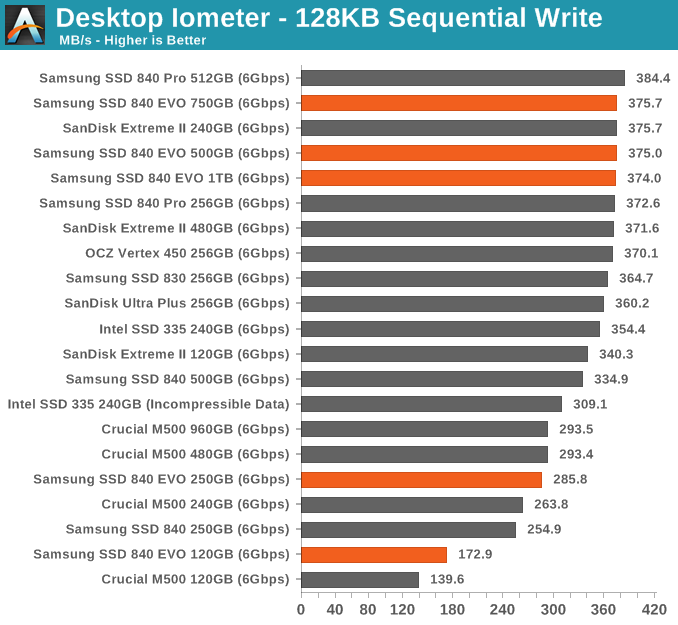
AS-SSD Incompressible Sequential Read/Write Performance
The AS-SSD sequential benchmark uses incompressible data for all of its transfers. The result is a pretty big reduction in sequential write speed on SandForce based controllers.
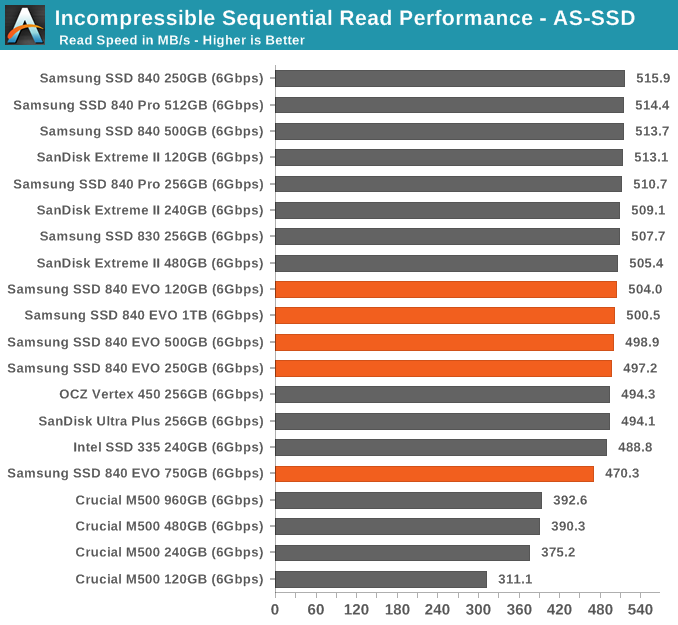
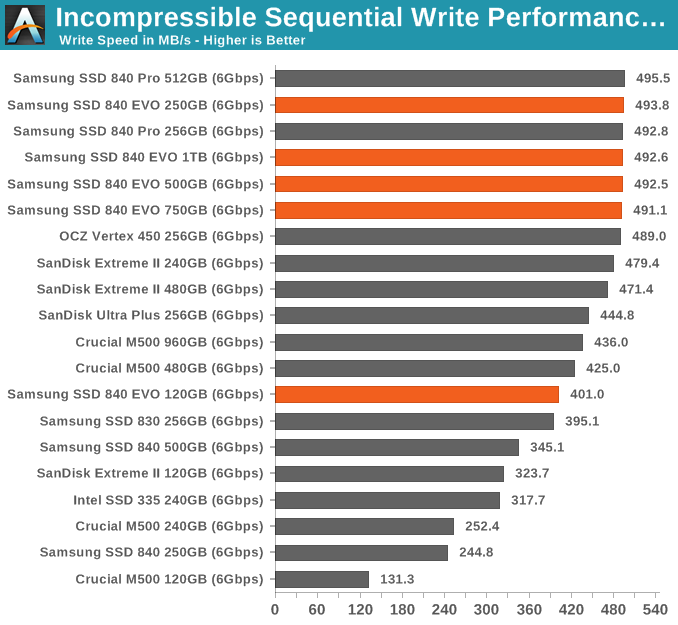










137 Comments
View All Comments
eamon - Thursday, August 1, 2013 - link
Unless you want to run some kind of continual I/O server, I suspect performance will be fast enough not to matter; I'd only look at pricing if I were you...Busverpasser - Thursday, August 8, 2013 - link
Hi there, great review, thanks a lot. Actually I do have a question... The article says "The performance story is really good (particularly with the larger capacities), performance consistency out of the box is ok (and gets better if you can leave more free space on the drive)..."Does leaving more free space mean that this space is supposed to be unpartitioned or just not filled with data? When I bought my Intel Postville SSD some time ago, I left some space unpartitioned but never really knew whether that was the right thing to do :D. Can someone give me a hint here?
xchaotic - Wednesday, August 14, 2013 - link
@Busverpasser just leave more space free, it doesn't have to be unpartitioned.Worst case if you need that extra space for a while, you'll get lower performance, but more storage whenever you need it.
speculatrix - Saturday, August 17, 2013 - link
the table titled "Samsung SSD 840 EVO TurboWrite Buffer Size vs. Capacity" should be titled "Capacity vs Usage vs Endurance"rdugar - Friday, August 23, 2013 - link
Am in the market for an SSD finally to replace an HDD on a Windows 7 laptop. Was almost set on the 128GB Samsung 840 Pro, but saw the comment on poor performance at almost full capacities.Price, reliability and endurance being the most important to me, which one should I go for?
128Gb Samsung 840 Pro? approx $119 after coupons, etc.
120 GB Samsung 840 EVO? probably $99 or so
256 GB Samsung 840 EVO? probably $165 or so
Other brand and model?
If I have to spend $120 odd, may as well spend another $50 and get double the capacity....
tfop - Saturday, August 24, 2013 - link
I have a question regarding to the NAND Comparison table.How do this Page and Block sizes affect the right Clustersize and Alignment of the Partition?
If i am getting this right, the SSD 840 EVO would need a 8 KiB Clustersize and a 2 MiB Alignment.
Gnomer87 - Wednesday, August 28, 2013 - link
I have a couple of questions:First, how much data is typically written to the average consumer HDD on a daily basis these days? I am thinking it's nowhere close to 50GiB. I guess what I am really interested in knowing, is how much data the operating system(windows 7) writes to the drive for various maintenance uses(if there are any beside defragmenting). In my mind, simply booting up the computer shouldn't mean any writes to the drive at all. Ergo, given my typical use, a 120GB SSD of that caliber, should last a lifetime. Am I right in thinking this? I mean, reading doesn't affect the durability right?
Secondly: I've been considering getting an SSD for use as a OS drive for a long time, reason of course was to speed up boot time. However, I've long wondered WHY windows boots so slowly from HDDs in the first place. After all, the amount of data loaded during boot up isn't large. In my case the processes post-boot take up around 200 MBs, Assuming the actual amount of data loaded from the drive is about the same, it really shouldn't take that long. My HDD is capable of reading up to 120 MBs in optimal situations, so it's obvious the boot up process isn't optimal by a long shot.
But why this slow? It can take over a minute before she(my computer) is done loading and starting all processes. Last semester I took course in Operating system at the local university. I must confess I was a horrible student, I didn't show up much. But I do remember a few key elements, namely the scheduler and how this scheduler continually does context switches, letting each process use the CPU, and thus creating parallelism. Now what was really interesting was resource management. It's the scheduler that decides which process is currently running on the cpu, and the scheduler process is run in between each context switch, effectively letting each user process run and have access to resources, such as the hard drive. Now, what happens if all the processes want data from the drive at the same time? Would each process continually interrupt the other processes loading of data, and thus causing the HDD to seek constantly?
Could that explain why booting takes such idiotic amounts of time? An extremely inefficient resource management that basically ignores the inherent seek-time related weaknesses of an HDD? SSDs, as we know, barely have seek-time, and thus the performance loss from context switching should be negligible.
I know my cousins SSD powered computer boots near instantly, once it's done with the usual BIOS stuff, the OS is booted and ready for use in mere seconds. And yes, we are talking a completely cold boot here, no sleep or anything like that.
abhilashjain30 - Friday, September 20, 2013 - link
I purchased Samsung 120GB EVO 3 days back from OnlySSD ( http://goo.gl/HqgjId )and Drive performance is too good compare to 120GB 840 Basic Series.abhilashjain30 - Friday, September 20, 2013 - link
Available at OnlySSD dot comabhilashjain30 - Wednesday, October 2, 2013 - link
Samsung Evo Series now available online in India. You can check on OnlySSD dot com or PrimeABGB dot com